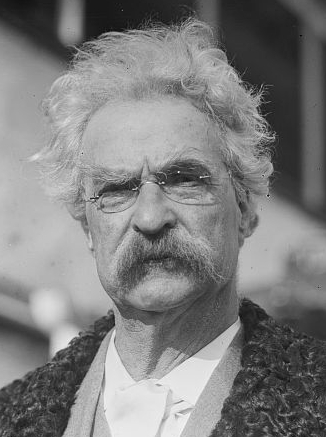Last week, I told I was almost done with Mark Twain’s A Connecticut Yankee in King Arthur’s Court and couldn’t talk about it in full yet. Now that I’ve finished it, I can say I appreciate it overall and it won’t make any list of recommended reading from me. It was a little long-winded, unevenly humorous, and the point driven home at the end is an ugly one.
Twain’s Yankee engineer is an ideal man, in a sense, and very lucky. He applies knowledge to a variety of fortunate occurrences and builds a brilliant reputation for himself. He quickly earns the loyalty of people who pull him through other scrapes, even to when he takes full credit for all actions afterward. He can practically create the entire nineteenth century in Medieval England on his own. And at the height of it, when Camelot falls apart as it does in the historic legend, he says, now we must push to destroy the Catholic Church and the order of chivalry. The final chapters depict this push with horrific bloodshed that could be taken as comic if there weren’t so many bodies on the ground.
Aside: I was offended by Merlin’s stunt at the very end, because when has he demonstrated any skill of this kind before? Is or is he not a charlatan?
What should readers take away from this application of Progressive ideals on the medieval world? Does the Yankee triumph? Does he accomplish his goals?
A Connecticut Yankee was published in 1889, the end of a pretty good decade in the United States. That was before the Spanish-American War for Cuban independence, the Philippine-American War against Filippino independence, the Russo-Japanese War in which the US worked for a balance of powers, and conflicts over the building of the Panama Canal. Theodore Roosevelt was a player in all of these. After these came World War I and the Bolshevik Revolution, so one would understand if viewers came away with the impression that the great Progressive Era ushered mankind into the position he’s always wanted–to play God. If the Yankee’s ideas would not be accepted by rubes too thick to see the wisdom of them, then the rubes could die, and should die to out of the way of progress, and would die in front of the Yankee’s superior technology.
Twain was a member of the Anti-Imperialist League that opposed the U.S. war effort against the Philippines and various conflicts that gave a sense of an expanding American empire. Twain may have asked, if we were a free nation, why would we fight to subjugate other nations? Which is the very thing the Connecticut Yankee attempts in the end. He presses his ideals into tryanny and in a manner of speaking murders everyone. Maybe that was Twain’s point.
Anyway, let me share a few links before I let you go for the day.
More on Connecticut Yankee: James Turner has a long piece on Medievelists.net. “A Connecticut Yankee in King Arthur’s Court found some of its greatest and most engaged champions with Soviet artists, perhaps unsurprisingly when you consider the novel two-pronged critique of both the inherent corruption and excesses of aristocratic society and its cautious approach to the cold heart and supposedly self-defeating exploitation of workers under the capitalist system.”
Recommended changes: Agrarian author Wendell Berry offers revisions to the Marvel cinematic universe in this piece by Jeff King. “The villains have just not been believable. Why a squinting, purple monster looking to eliminate half of life in the universe when the strip mining industry is right there?”
Hot Cross Buns: Alban Buns (the precursor to our Hot Cross Buns) were first baked in 1361 and given to the poor on Good Friday. This and more history of one of my favorite rolls from Richard Baxter.
Role Models: With Purim starting, Mijal Bitton suggests American Jews look to Esther as a role model. “Esther symbolizes the way too many Jews feel today — confronted by rising hatred against their Judaism.”
Good Fun: A little love for Don Quixote. “Cervantes is ingenious.”




